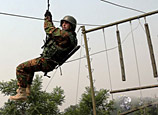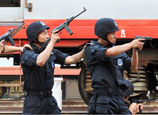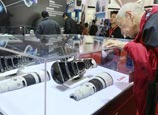
SEOUL, June 18 (Xinhua) -- High-level talks between South Korea and the Democratic People's Republic of Korea (DPRK) were called off last week. If it happened, it could have ended the no-dialogue period between the two sides under the former Lee Myung-bak administration.
Pyongyang criticized Seoul for its discourtesy, saying that South Korea downgraded the rank of its chief delegate from the originally planned ministerial-level talks. Meanwhile, Seoul blamed the DPRK for not following practices, saying that Pyongyang, the visiting side, should have offered the list of its five-member delegation first.
Past South Korean governments, including the Kim Dae-jung administration, could have accepted most of terms demanded by the DPRK to defuse tensions through dialogue. Under the so-called Sunshine Policy from 1998 to 2007, Seoul conducted the unprecedented engagement policy toward Pyongyang.
The Park Geun-hye government refused to do it as witnessed in past conservative governments such as the prior Lee Myung-bak administration. Former President Lee maintained "strategic patience" as its DPRK policy, and faced criticisms of being negligent toward the DPRK issue amid the growing need for tension alleviation.
President Park's DPRK policy, however, was different from those in the past conservative governments as well as from progressive governments.
The previous conservative governments overemphasized the necessity for unification and took a hard-line stance, dismissing the need for coexistence of the two Koreas and denting the inter- Korean relations. The Sunshine Policy advocated by progressive governments overly focused on the coexistence and cooperation, failing to prevent the DPRK from developing nuclear weapons.
"During the Sunshine Policy, South Korea was too eager to improve inter-Korean relation, and unilaterally moved to provide large-scale economic aid to the North (DPRK) first, while expecting positive response from the regime later," Choi Jin-wook, a senior research fellow at the Korea Institute for National Unification (KINU), said in a June 11 article.
Choi noted that the Sunshine Policy failed to stop the threat of provocations and the risk of political agreements being broken by the DPRK, stressing that it was due to lack of trust between Seoul and Pyongyang.
To build trust, the Park Geun-hye government launched the " Trust-Building Process on the Korean Peninsula" as its DPRK policy, with the thinking of "returning to basics" in mind. President Park brought the word "trust" to the forefront of Seoul's Pyongyang policy for the first time.
Past policies of both extreme "hawk" and "dove" failed. If security is overstressed, exchanges and cooperation can be stunted. If exchanges and cooperation are hastily pushed forward, security can be held back.
"Instead of moving too quickly or too slowly like in the past, it would be desirable for South Korea to deal with inter-Korean relations at a rate constant with the level of trust that is built with North Korea (DPRK)," said Choi at the KINU.
"The Trust-building Process on the Korean Peninsula can be seen as a shift in the North Korea policy paradigm."
The trust-building process aimed to gradually build trust between Seoul and Pyongyang, like "stacking bricks" via verifiable conducts based on firm security. Neither would it allow for unilateral and unconditional concessions nor compensate for the DPRK's provocations.
"I will take a firm grip on security issues first. A step forward, I will pursue a sustainable peace based on trust and cooperation," President Park said at the speech for policy direction for diplomacy, security and unification on Nov. 5, 2012 during her presidential campaign.
President Park put firm security at the basis of its DPRK policy, aiming to strengthen deterrence against nuclear and missile threats from Pyongyang. But, the top priority was placed at the normalization of inter-Koran relations by building trust through verifiable actions.
The verifiable actions meant keeping promises made by the DPRK in the past. Park said in the Nov. 5 speech that various communication channels should be open to build trust, but she stressed that the DPRK should keep its promise first.
Following the cancellation of the high-level inter-Korean talks, Unification Minister Ryoo Kihl-jae said that Seoul was open to the dialogue with Pyongyang, but the minister urged the DPRK to show sincere attitude first.
The trust-building process called for Pyongyang's positive response. If the DPRK does not positively respond to South Korea's efforts to build trust, international support would be necessary.
"In the past, the Sunshine Policy failed to win support from the U.S., whereas the Lee Myung-bak government had difficulties in gaining support for its North Korea policy from China," said Choi at the KINU.
"The most important factor in enforcing a North Korea policy is gaining cooperation from the U.S. and China."
Based on trust verified by actions and international support, Park aimed to build an economic community with political union as its ultimate goal.
"Trust is necessary at the starting point for building a new Korean Peninsula. National trust, inter-Korean trust and international trust should be built," said President Park.
















 Sweating at Yoga club: white collars' new choice after work
Sweating at Yoga club: white collars' new choice after work


![]()
